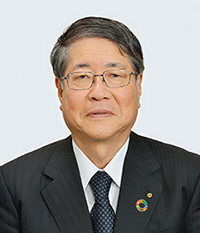Messages from outside directors
Manufacturing governance means “keeping promises”

For manufacturing companies, governance is not simply a matter of not doing hings that are illegal; it means “keeping promises” with customers, employees nd other stakeholders. Its essence is relationships of trust, in protecting the afety and health of customers and employees, not passing on defective parts, chieving costs, observing delivery dates, protecting the local environment and roviding employment. In a broader sense, it means not betraying expectations.
The idea of sustainable manufacturing is also important in keeping promises. Responding to crises, such as disasters, epidemics or accidents, requires preparation against risks and workplace skills. Rapid problem-solving ability is key, especially in dealing with the unexpected. For this it is crucial to develop workplace skills and raise problem-solving abilities through regular kaizen activities.
Governance in the age of carbon neutrality.
Focus on trends in renewable energy and hydrogen

The Paris Accords call for keeping the rise in temperature down to 1.5–2℃, and major countries including Japan have committed to carbon neutrality by 2050.
More than eighty percent of greenhouse gas emissions is CO2 related to energy, and renewable energy and electrification are the base from which to approach decarbonization. However, for heat that is difficult with electrification, decarbonization is done with hydrogen and methane derived from hydrogen, while for materials derived from fossil resources such as chemicals, decarbonization is done with hydrogen and bio-derived materials. This green hydrogen demand gives rise to enormous demand for renewable energy in manufacturing processes and is promising for a positive cycle of growing supply and lower costs for renewable energy and hydrogen.
It is important for management to anticipate the timing and methods of decarbonization in each field as well as the speed at which renewable energy and hydrogen will spread and their costs go down, and then to take measures and preparations with this in mind. Carbon neutrality in the manufacturing industry requires looking into commercialization of renewable energy and hydrogen without fixating on energy reductions only.
Climate change and sustainable company growth

The Intergovernmental Panel on Climate Change (IPCC) published its Sixth Assessment Report in August 2021, and warned of impending crisis for billions of people from greenhouse gas emissions.
Environmental problems are closely interwoven with the economy. Steps for carbon neutrality will impact many areas for automotive parts manufacturers, and business must adapt to electrification. Toyoda Gosei is disclosing information recommended by the Task Force on Climate-related Financial Disclosures (TCFD), and has begun discussions for scenarios with a medium- and long-term view to 2030 and 2050. It is currently taking actions for decarbonization.
I hope the company will actively disseminate information on its efforts for sustainability, not only via paper media and websites, but also social media and other means, and create even greater corporate value on the global market.